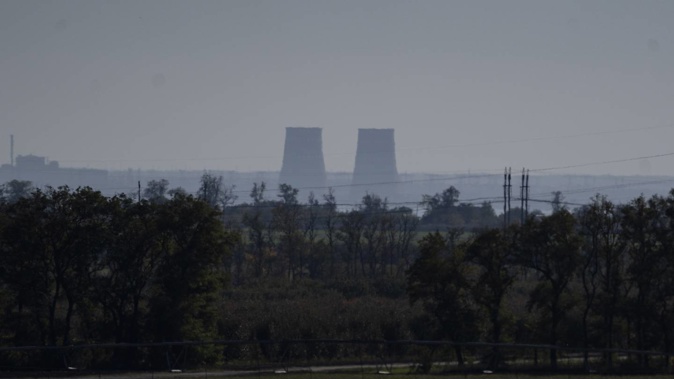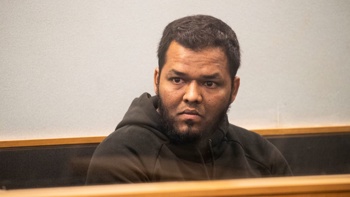
Europe’s largest nuclear power plant is relying on emergency diesel generators to run its safety systems after external power from the Ukrainian electric grid was again cut off, Ukrainian and UN officials have reported.
Fighting in Ukraine has repeatedly damaged power lines and electrical substations that the Zaporizhzhia Nuclear Power Plant requires to operate in-house safety systems, forcing workers to turn to backup generators to cool its six reactors until regular power is restored. All six reactors have been shut down. The generators have enough fuel to maintain the plant in southeastern Ukraine for just 15 days, state nuclear power company Energoatom said.
“The countdown has begun,” Energoatom said, noting it had limited possibilities to “maintain the ZNPP in a safe mode.”
The UN’s International Atomic Energy Agency confirmed the switch to backup diesel generators and said that underlines “the extremely precarious nuclear safety and security situation at the facility”.
Rafael Grossi, head of the UN nuclear watchdog, said relying on diesel generators “is clearly not a sustainable way to operate a major nuclear facility” and urged again that a protection zone be established around the plant.
Russia and Ukraine have traded blame during the war for shelling at and around the plant. Energoatom said on Thursday that Russian shelling knocked out the last two high-voltage transmission lines feeding the Zaporizhzhia plant. Russia gave a different account, blaming Ukraine.
The Russian state-run news agency Tass quoted an official at Russia’s nuclear power operator, Rosenergoatom, as claiming that Ukraine had switched off the two power lines and denied that Russian shelling of power lines had caused the problems. He said the move deprived the city of Energodar, where the plant’s workers live, of heating.
Russian forces have occupied the plant since early in the war. It is located in the Zaporizhzhia region, one of four regions that Russia has illegally annexed. Although Russian President Vladimir Putin signed a decree transferring the nuclear plant to Russian ownership, Ukrainian workers continue to run the station.
Energoatom said Russian officials are trying to connect the power station to Russia’s power grid so it could supply electricity to Crimea, which Russia annexed in 2014, and Ukraine’s Donbas region, another area Putin annexed.
The human toll from earlier battles became evident again on Thursday when Ukrainian officials said 868 bodies of civilians, including 24 children, were found in liberated areas of the Kharkiv, Donetsk and Kherson regions. National police official Oleksii Serhieiev also told reporters 34 torture sites were found after Russian troops retreated from those areas, as well as the Kyiv, Sumy and Chernihiv regions.
Elsewhere on the battlefront, Russia used drones, missiles and heavy artillery to hit several Ukrainian cities, leaving six civilians dead and 16 wounded, according to the president’s office. Russian attacks on Ukrainian President Volodymyr Zelenskyy’s hometown of Kryvyi Rih left several districts without electricity or water.
Further east in the Donetsk region, battles continued for the towns of Bakhmut and Avdiivka, where authorities said the population was under constant shelling and living without electricity or heat. Six cities and villages in the region came under attack in the last day, while in the northeast, three Russian missiles hit Ukraine’s second-largest city, Kharkiv, officials said.
Across the Dnieper River from the power plant, the city of Nikopol was also shelled again, damaging residential buildings, a gas station and several businesses, Zelenskyy’s office said on Thursday.
In a rare hint of a possible retreat that Ukrainians treated with scepticism, a Moscow-appointed official in the occupied southern region of Kherson said Russian troops are “most likely” to move across the Dnieper River, away from the city of Kherson. Kirill Stremousov also told Russian state television that all Ukrainian attacks have been repelled.
Tens of thousands of civilians have been evacuated from the city of Kherson in the face of a Ukrainian counteroffensive. Russian authorities removed their country’s flag Thursday from the administration building in Kherson, a week after the regional government relocated.
Ukraine’s southern military spokeswoman, Natalia Humeniuk, said the flag’s removal may be a provocation “and we should not hurry to rejoice.” She also told Ukrainian television some Russian military personnel are disguising themselves as civilians.
Neither side’s claims could be independently verified.
On the humanitarian front, seven ships carrying 290,000 tons of agricultural products sailed from Ukrainian seaports for Asia and Europe, a day after Russia agreed to resume its participation in a programme allowing the export of Ukrainian grain. Putin said Moscow had received assurances that Ukraine wouldn’t use the humanitarian corridors to attack Russian forces.
Ukrainian Foreign Ministry spokesman Oleh Nikolenko denied that Kyiv had made any new commitments.
“Ukraine did not use and did not plan to use the grain corridor for military purposes. The Ukrainian side clearly adheres to the provisions of the grain agreement,” Nikolenko wrote on Facebook.
Kremlin spokesman Dmitry Peskov cautioned onThursday that Russia’s decision did not mean the deal would be extended after it expires on November 19.
Russia had suspended its participation in the grain deal last weekend, citing an alleged Ukrainian drone attack against its Black Sea fleet in Crimea. Ukraine said the Russians mishandled their own weapons.
In Moscow, the Russian Foreign Ministry summoned British Ambassador Deborah Bronnert on Thursday to protest what it alleged was British instructors’ help in the October 29 attack by drones on Black Sea fleet in Sevastopol, Crimea. Bronnert made no comment after the meeting.
Under the grain export deal, Russia was supposed to be allowed to resume fertiliser and grain exports, but Russian Foreign Minister Sergey Lavrov said on Thursday he hadn’t seen progress on that.
Since the deal was reached in July, 430 ships have exported 10 million tons of Ukrainian agricultural products to countries in Africa, Asia and Europe. Ukraine’s infrastructure ministry said export volumes in October “could have been 30 to 40 per cent higher if Russia had not artificially blocked inspections.”
UN Secretary-General Antonio Guterres hailed the 10 million-ton milestone and appealed to all parties to renew the grain agreement.
“I’m not optimistic, I’m not pessimistic. I’m determined,” Guterres told reporters in New York, adding it’s important to clear obstacles for Russian food and fertiliser exports.
Both sides announced another prisoner exchange on Thursday, involving 214 military personnel in total.
Elsewhere, a Ukrainian military official said Russia is using Belarusian territory to launch drone strikes. Oleksii Hromov said Iranian drones are flying into Ukraine from a military base in the Belarusian city of Luninets, 100km north of the border.
The UN nuclear agency, meanwhile, said on Thursday its inspections have found no evidence to support Russia’s unfounded claims that Ukraine is planning to set off radioactive “dirty bombs” after examining three locations in Ukraine. Western nations have called Moscow’s repeated claims “transparently false.” - AP
Take your Radio, Podcasts and Music with you









